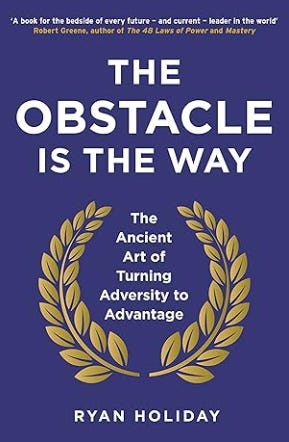Meditations Session 4.2: On Obstacles
Since we will never be without obstacles, we would be wise to learn to take advantage of them.
Throughout Meditations, Marcus Aurelius continually calls out the excuses he makes for his inappropriate behavior. We, too, are ready with excuses, usually blaming what we think are obstacles in our way.
In frustration, we may blame external forces and the actions of others for obstructions. Responding with anger, we may take actions we later regret.
Contemporary Stoic writer Ryan Holiday wrote The Obstacle is the Way inspired by Marcus’s entry 20 in Notebook 5.
As a supplement to Session 4, this is a deep dive into entry 5.20.
Holiday asks, “Is our perspective truly giving us perspective or is it what’s actually causing the problem?” “Right action,” he explains, will follow “the right perspective.” Our study of Meditations is based on the idea that taking an honest look at our erroneous perceptions leads to change.
In Mindset Shifts U, we have been working with Waterfield’s translation. In 5.20, Waterfield is referring to people or whatever else seems to be an obstacle when he writes “these things”:
These things may impede some of my activities, but they can’t impede my impulses or my state of mind, because I have the powers of reservation and adaptation. The mind can adapt and alter every impediment to action to serve its purpose; something that might have hindered a task contributes to it instead, and something that was an obstacle on the road helps you on your way.
While the Waterfield translation provides valuable context, the translation by Gregory Hays is perhaps more evocative:
Our actions may be impeded by them, but there can be no impeding our intentions or our dispositions. Because we can accommodate and adapt. The mind adapts and converts to its own purposes the obstacle to our acting. The impediment to action advances action.
Like Marcus, we can use obstacles to our advantage. Marcus’s choice of purpose didn’t control circumstances in the world, but it determined his reaction to events.
When he failed to meet his standards, he could make another choice guided by his purpose and values in the next moment. In 5.9, he chided himself “not to feel exasperated, or defeated, or despondent because your days aren’t packed with wise and moral actions. But to get back up when you fail, to celebrate behaving like a human—however imperfectly—and fully embrace the pursuit that you’ve embarked on.” (Note: I’m sharing the Hays translation here. In the overview for this session, I used Waterfield’s translation of 5.9.)
In Holiday’s words, Marcus points us to consider that we thrive “not just in spite of whatever happens but because of it.” Because of what happens, we have a chance to learn. We can become more virtuous through facing trials.
How often do we use our trials not to learn but to claim victimhood? Holiday probes, “What are we missing? It’s simple: a method and a framework for understanding, appreciating, and acting upon the obstacles life throws at us.”
Holiday reminds us, “Earlier generations faced worse problems with fewer safety nets and fewer tools. They dealt with the same obstacles we have today plus the ones they worked so hard to try to eliminate for their children and others.”
Our bodies are full of processed foods. Our minds are full of junk media. Regarding what needs to be done, “I don’t feel like it” is a common mantra. Holiday chides, “We’re soft, entitled, and scared of conflict.”
Since we will never be without obstacles, we would be wise to learn to take advantage of them.



